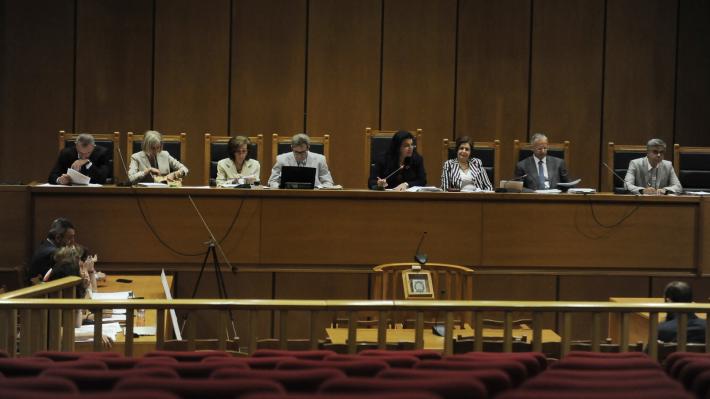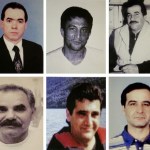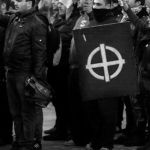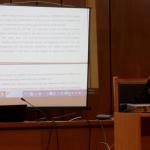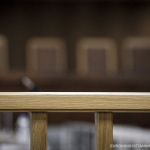154th Hearing, Court of Appeals, May 16th, 2017
I. Access to the Court
The courtroom remains open to the public upon presentation of a state ID card, which is retained by court authorities for the duration of the session, until all audience seats in the courtroom are filled. There was reduced attendance by the public and the members of the press, and the usual level of police presence in the courtroom.
ΙΙ. Presence and representation of the defendants
None of the defendants were present at the hearing.
III. Comments on the witness testimonies of Christos and Efstathios Antiochou, Barbetakis, Frangomichelakis, Mourkogiannis, Baoustanou, Papazisis, Tsakanikas, Troulou, Mavridis, Alivizatos, and Andreopoulos.
A. Comments on the witness testimonies by the civil action counsels.
Civil action counsel Sapountzakis was the first to take the floor for the statements concerning the witness testimonies. Concerning the attack in Crete he said that the witness testimonies show that the protesters weren’t aggressive, that the Police were performing their duties, that the MPs were the ones that were the leaders in the incident, and that their behavior was hostile. More specifically, their stance betrayed their arrogance, and the words they said to Frangomichelakis showed their utter contempt for public officials, and especially towards the police officers, in their line of duty. Concerning the incidents in Paros he stated that witness Troulou watched the movie The Serpent’s Egg by Bergman, whose subject is the rise of fascism in Germany, something that illustrates the fact that teachers fight fascism with the power of art. Commenting on the testimonies, he said that the victims in this instance were peaceful, and that Michos and the Golden Dawners were aggressive. Michos’ intent was not simply criminal, but murderous as well, because when a man the size of Michos smacked a woman 1,69 m tall in a concrete wall, he could have crippled her for life, and we shouldn’t rule out death as a possibility if Mavridis hadn’t intervened. At the same time, the police force was excessive considering the size of the island. The civil action counsel stressed that Mavridis said “I was afraid, at the time Golden Dawn enjoyed a kind of immunity”. He labeled Golden Dawn a criminal organization, not a political party. Concerning the witness testimony by Alivizatos, he said that in order to classify Golden Dawn as a criminal organization, the professor said that there are articles in the Criminal Code that can be utilized. He spoke of three concentric circles: The first is the core of the organization, the second includes those that take part in the criminal activities, and the third one includes the voters that cannot be prosecuted, but must be morally isolated. The witness also stated that violence is intrinsic in Golden Dawn and it is what differentiates it from other political parties. The witness said that Golden Dawn cannot exist without violence, that it is driven by the assault squads, and that it is unheard of for a liberal democracy to neglect to act.
Concerning the attack on Antiochos, civil action counsel Malagaris said that it was shown that military garb was used, the site of the attack, which is near the offices of the local chapter of Golden Dawn, and the victim, who resembled an anarchist. The victim said that one of the assailants had the leading role – the one that asked him for his ID. For the umpteenth time the witness was asked whether the assailants were members or just voters of the party, something which, according to the civil action counsel is not the point, because it’s not just the membership card, but the criminal acts themselves, that are proof of guilt. Concerning the incidents at the Belvedere Hotel, he noted that the goal of Golden Dawners was to succeed in what they did in Paros, which was to cause grievous bodily harm and to put into action the threats of Kasidiaris. The leadership of Kasidiaris is crucial for the indictment of criminal organization, and because he is a member of parliament. Concerning the incident in Missolonghi, he stated that there too were present MP’s that supervise the criminal acts. The same interventions were made in other parts of Greece, something which shows there exists a unified leadership. Concerning the witness testimony of Alivizatos, he stated that it was shown that the choice of putting the MPs as candidates in an election shows the trust of the leader in their person. He said that the parliamentary function is special for this reason alone. Concerning the witness testimony of Andreopoulos he stated that there was a coordinated increase in the numbers of attacks up until the murder of Fyssas, and the assailants were stating that they were members of Golden Dawn, not to mention that the attacks demanded extensive training.
Civil action counsel Zafeiriou talked about the connection between the political party of Golden Dawn and the criminal organization of Golden Dawn. Troulou identified Michos as the assailant and leader of the assault squad, and as for the attack itself she said it had all the characteristics of a premeditated attack. Concerning the ideology of Golden Dawn, Troulou said that it is an organization with an intolerant ideology, that it respects neither human life nor human rights, and that it has strong relations with fascism. Concerning the witness testimony of Alivizatos, she stated that there is a consistency, that the entry into parliament is a crucial point in the ascendancy of Golden Dawn in 2012. When the professor perceived the common origins, he refused to accept that the incidents were unconnected. In conclusion, the party of Golden Dawn is the theoretical application of the activity of assault squads and the imposition of Nazi ideals. She stressed that the party is closely connected with the criminal organization, and that not once did an assault squad appear without the participation of one or more MPs. The party and the criminal organization share a single name – Golden Dawn. Alivizatos went on to mention that its logo is Nazi, even though the Golden Dawners claim it is nationalist, and the motive behind their crimes is their Nazi ideology, which arms the hands of the defendants.
Concerning the attack on Antiochos, civil action counsel Vrettos said that the witness was attacked because he was dark-skinned and because they thought that he was dressed in a “different” manner. The same witness confirmed what his father said and that when he was stopped, they told him “Golden Dawn calls the shots here”, and then ran away. Concerning the attack in Chersonisos, the counsel said that, despite the cautious testimonies by Pantagakis and Frangomichelakis, it was nonetheless shown that Kasidiaris acted as if he was the leader, based on the words he used. Concerning the attack on the Missolonghi street fruit market, witness Mourkogianni confirmed that the organized attacks lead by Barbaroussis, as well as that the goal was the full control of street fruit markets. Concerning the testimony of Alivizatos, the counsel said that his profession is of extreme importance. The witness had been the victim of an attack in the Old Parliament House, and a personality of recognized competence, who contributed significantly to the things that this trial is deliberating. He mentioned that concerning the unified structure, the fact that he has seen uniforms, leads him directly to the assault squads, which are a repetition of Hitler’s model. Violence is intrinsic in the organization, and it approves of criminal activities. Finally, the civil action counsel said that the testimonies confirmed the existence and operation of strike teams, also known as assault squads, which acted in concert, following the orders of a leader, which was always one of the defendant Golden Dawn MPs. The testimonies proved Golden Dawn’s criminal activities against anyone it deems as “other”, not normal, racially inferior, or political adversary, and furthermore he following were confirmed: the uniform dress and the blind obedience to the leader.
Civil action counsel Stratis stated that the attack on Antiochos took place because the assailants did not like the victim’s appearance. He also said that it is enough to look like a leftist or an immigrant to get attacked, and that the goal of these attacks is fear, as was shown by the ideology of Golden Dawn. As for Belvedere, civil action counsel Stratis said that Kasidiaris tried to create a climate of tension, and that the leadership is always present in the cases that have been examined up to this hearing, which is what happened in Paros, too. He stressed that Golden Dawners act in groups, and that the Paros group was an assault squad. Also, the fact that these incidents happened in public spaces is connected with the sense of immunity enjoyed by the defendants. Concerning the incident in Missolonghi, witness Mourkogiannis confirmed that Barbaroussis and the others were performing racial inspections, whose motive was purely racist, because Golden Dawners support the purity of the Greek race. Furthermore, witness Andreopoulos was receiving complaints from immigrants, and the attacks on them had a clearly racist character, not a personal one. His opinion is that the assailants were organized and trained. Concerning the witness testimony of Alivizatos, the civil action counsel stressed that the professor labelled Golden Dawn definitely Nazi, and also said that Golden Dawn can’t exist without violence. The witness did not judge the party’s ideology in the same way that it judges itself, but objectively, based on its symbols, racist language, its hate for everything different, and its modus operandi. The civil action counsel concluded by saying that whatever is the name we could give to the ideology of Golden Dawn, it has been condemned by history as Nazi.
Civil action counsel Papadopoulou remarked that the Golden Dawners wanted to make known their presence and authority. The violent incidents in Missolonghi and Rafina took place in front of cameras, which had obviously been called in advance. The civil action counsel spoke about an all too clear attempt to supplant the State and the rule of law, and added that the organization aimed to create a climate of terror. Concerning Heraklion, the counsel stressed that the Golden Dawners wanted the same results they got in Paros, that is to drive the police to attack the protesters. When they saw that this wasn’t going to happen, they tried to break through police lines and attack them themselves. She also referred to the witness testimony by professor Alivizatos, who said that Golden Dawn can’t exist without violence, and also clarified the crucial difference between Golden Dawn violence and other kinds, which can also be discerned by the common leadership motive. Finally, she added that Golden Dawn respects the rule of law in name only, and if it came to power it would establish a Nationalist-Socialist state.
Civil action counsel Kabagiannis said that violence is an important ingredient of the cases that are being examined, but that which unifies them is the relation between the criminal activity of Golden Dawn and the rule of law, and more specifically the false belief that its members have a legitimate prerogative to do the things they do. Concerning the street fruit market of Missolonghi, the counsel stated that it illustrates the full supplanting of the State, as was confirmed when they told Mourkogiannis to leave and go back, so that he would be substituted by the Golden Dawn assault squad. Concerning Antiochos he said that it is one of those typical cases where Golden Dawn acts as police force. Furthermore, the civil action counsel stressed that in this case they chose the person at random, and in general targets are not decided based on their identity, but on general characteristics that place the victims in the dissident groups. The counsel stressed that it makes no difference what the victim has done, but how it is perceived by the assailant who says “Nazis call the shots now”. Concerning Heraklion he said that Golden Dawn wanted to wrest control of the security measures from the police. The reason why Kasidiaris wasn’t arrested was that he was a member of parliament. Concerning the incident in Paros he said that it is a logical consequence after the events at Belvedere since, even though there were ample policemen, members and supporters of Golden Dawn hit Troulou and Mavridis on the head. Concerning the testimony of Alivizatos, the counsel noted that the motive of Golden Dawn is the creation of a climate of fear and the establishment of a Nazi state, while the financial motive is merely an aggravating factor and not the core of its structure. Concerning witness Andreopoulos the counsel said that what he was called to testify about form the general characteristics of racial violence.
Civil action counsel Skarmeas commented that the crucial common element of all testimonies is the assault squads, and what must be looked into are the acts that fall under article 187 CCP, and also the MPs that take advantage of their parliamentary immunity to lead the members of Golden Dawn to commit criminal acts. He mentioned the examples of Michos in Paros, Barbaroussis in Missolonghi and in the Tsakanikas case, Kasidiaris in Crete, Panagiotaros in the Old Parliament House, Germenis shouting “Giddup!” – and these are only 5 incidents described by 14 witnesses. The counsel said that we can’t still be talking about isolated actions of hothead supporters.
B. Comments on the witness testimonies by the defense counsels
The first defense counsel to take the floor was Pantazi who said that we should note the part in the testimony of Antiochos’ father, who said that, after the incident, he himself tried to find the assailants, calling people he knew in Golden Dawn. The counsel claimed that this is of interest, because her principals, Boukouras and Alexopoulos, went into a legitimate political party with a legitimate presence. The fact that the witness communicated with legitimate members means that there are people in Golden Dawn that do not participate in violent acts. Concerning the incident in Paros the defense counsel noted that it constitutes the criminalization of an everyday incident that falls under the events organized by a political party. The counsel also added that Ms. Troulou was a kindergarten teacher on the island and, while she was afraid to press charges, she wasn’t afraid to hold a banner and shout slogans such as “fascists, hangings”, etc. The counsel added that we should not let the prosecution witnesses become the enemies of democracy. Concerning the testimony of Alivizatos, the counsel explained that, compared to the time that this particular witness spoke of, Golden Dawn has grown politically, and the witness is not familiar with her principals and had nothing to say about their entry into a criminal organization. He did speak about the irrebuttable presumption of prosecuting members of parliament and that the a priori prosecution of the whole of the parliamentary group bothers him as a legal professional. The defense counsel added that, as regards her principals, no crime has been committed, and that each MP must be examined separately. In conclusion, the defense counsel made a distinction between hate speech and acts of violence.
Defense counsel Kontovazenitis commented that professor Alivizatos is not an eyewitness of any of the incidents and that the Court is in need of indisputable evidence, not of conjectures and subjective judgments.
Defense counsel Papadelis mentioned that the previous testimonies can be separated into a series of facts and the testimony of Mr. Alivizatos. He stressed that anarchists hold demonstrations because they enjoy a kind of immunity, and commented on the things that witness Alivizatos said about immunity, [university] asylum, the smashing of ATMs, and the incursion into the Council of State. He added that, contrary to these incidents, the tone of Golden Dawn is bothering some people, however the tone does not constitute the forming of a criminal organization. He went on to say that the beating of “a kid in Patras” does not fall under article 187 CCP, and that all these things happen in order to make an indictment more severe, something that was indeed a success. Furthermore, the defense counsel noted in the testimony of Alivizatos the noun “vagueness”, and the verbs “I surmise”, “I think”, “I feel”, “I believe”, “I judge”, and the fact that he was not an eyewitness of any events, and that in the Old Parliament House were gathered people of advanced age. The defense counsel concluded by saying that this is a process that, by the way that it was put into motion and organized, makes the burden of the defense and the Court even more difficult since, if the professor’s witness testimony was taken as granted, it would be proven that his testimony is comprised of things that he believes, thinks, surmises, and by “vagueness”. Finally, the counsel said that it is unacceptable that the court calls to the stand only opponents of Golden Dawn.
Defense counsel Dimitrakopoulos mentioned that the incident in Patras was an isolated one, but on the other hand the event in Crete had been announced in advance, while outside a different, aggressive, event had been organized, which aimed to gain access to the hotel and disrupt the Golden Dawn event, and in Paros the protest march was combative and its objective was to destroy the taverna and cause chaos. Concerning Mr. Alivizatos he said that, while he is a professor of recognized scientific standing, at the same time he is a person with set ideological beliefs and blinkers, and that it is unacceptable for him to claim that a political party is not equal with the rest. He was called, as the counsel said, to perform an ideological act, and he didn’t come by chance.
Defense counsel Tsagas stated that the witnesses tried to establish the indictment using the dogma of collective responsibility, however personal responsibility has not been proven by the witnesses using specific facts. The defense counsel added that Mr. Alivizatos was inconsistent with his own training, that he is not interested in the legal aspect but only to deprive Golden Dawn MPs of their civil rights, while his knowledge of the incidents he testified for was sketchy. Concerning the Paros incident the counsel stated that a section of society that is described as terrified not only does not gather peacefully, but also goes around riot police barricades etc. Concerning Crete he said that the police units were there to protect the Golden Dawners that were holding their event. Furthermore, the defense counsel claimed that nowhere was it shown even a single criminal activity that falls under article 187 CCP. Concerning witness Andreopoulos he said that he had nothing to add that has any relation to the essence of the indictment. Concerning Patras he said that the supporter of a political party can commit various acts, however when that same party has members with a specific mode of appearance, it can’t be claimed that the party aims to exterminate people with this appearance.
Defense counsel Zografos mentioned that we lack the certifiable facts that could yield objective results that fall under the article that the Court now contemplates. Concerning Patras, the witnesses have not been cross-examined with other eyewitnesses, no arrests or investigations have been made, only conjectures and mere ideological positions remain that have not been examined according to simple logic. Concerning the incident of Paros he said that Mavridis is a professional anarchist and even though he is from Paros, he didn’t clear up whether he knows the alleways of Paros, and it is clear that he was a leader in the incident but lacks the courage to come out and say it. Concerning the testimony of Alivizatos, the counsel noted that he strayed many times in judgments and moralizing, even though he is of recognized competence, while concerning the distinction between acceptable and unacceptable violence, he set down various criteria that are not included in the Constitution or criminal law.
Concerning the testimony of Alivizatos, defense counsel Oplantzakis said that it isn’t possible that on one hand he made some vague estimates, and on the other that he has followed closely, as he claimed, the developments. The counsel also claimed that the witness gave a “plebeian” interpretation of the Constitution, that he is malicious and not only he is not a credible witness, but had nothing of substance to offer to the Court.
Concerning the testimony of Alivizatos, defense counsel Roussopoulos mentioned the Papakonstantinou trial, and stressed that the witness spoke about the incident in the Old Parliament House in which, as the counsel said, there was an assault squad comprised of people advanced in age, while the supposed assault squad from Agios Panteleimonas was comprised of Romanians, Bulgarians, Jews, and transsexuals, and which was later labeled “a Golden Dawn assault squad”. He added that it is the first time in a liberal democracy that he has heard that political parties are not equal and that the only party that is not equal is Golden Dawn, and that is because the things they say annoys some people. Concerning Missolonghi he said that the whole thing is a fantasy which can only be excused in very young people. Concerning Paros he added that Troulou went along with the protest march to riot and that during the march were heard slogans such as “Hang the fascists, dirt and shovel for Kasidiaris”, something that was obviously “in line with the peaceful character of the protest”, as the counsel sarcastically noted.
Finally, defense counsel Alexiadis said that none of the witnesses could give a clear answer about whether the incidents that they came to testify about were real, whereas the incident in Paros reminds him of agents provocateurs. Concerning the testimony of Alivizatos he said that it would make a fine talk in an amphitheater, but his words have no legal standing. Concerning Andreopoulos he said that if the witnesses that are presented as victims can’t prove their claims with facts, then they stand against all logic.
At this point the presiding judge adjourned for Monday, May 22nd, at the Court of Appeals, where the comments of the defense counsels are expected to conclude.

